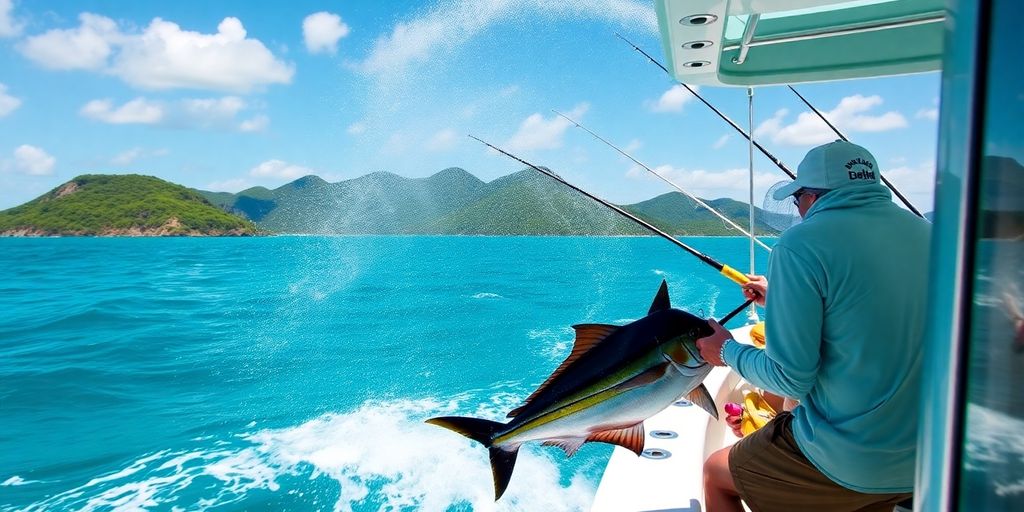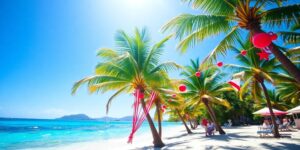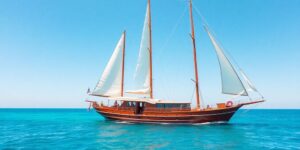Thinking about fishing in the British Virgin Islands? It’s a pretty amazing spot, honestly. The water is super clear, and there are tons of fish. Whether you’re a total beginner or have been fishing for years, you’ll find something to get excited about. Plus, the islands themselves are just beautiful, making it a great place to relax and have some fun. It’s definitely a trip worth considering if you love the water and a good catch.
Key Takeaways
- You’ll need a 30-day fishing license to cast a line legally in the BVI. Make sure to apply ahead of time, as it can take a bit to process.
- Some fish are off-limits, like turtles and lobsters, so it’s smart to know the rules. Catch-and-release is a good idea for big game fish like marlin.
- Spots like North Drop are famous for marlin, while Anegada’s flats are perfect for fly fishing. Tortola’s coast offers a bit of everything.
- Hiring a local guide or charter can really help you find the best fishing spots and understand the local patterns.
- Pack light, breathable clothing, a good hat, and sunglasses to stay comfortable and protected from the sun while you’re out on the water.
Understanding Fishing Licenses and Regulations
Before you even think about casting a line in the British Virgin Islands, it’s important to get your paperwork in order. You’ll need a 30-day fishing license to legally fish here. Most fishing charters can help you sort this out, which is super convenient. If you’re planning a longer stay or multiple trips, you might need to look into different license options, but for most visitors, the 30-day one is the way to go. It’s a good idea to apply for this at least two weeks before your trip, as processing can take a bit of time. You’ll need to submit an application with your ID and payment to the Department of Conservation & Fisheries.
Obtaining Your 30-Day Fishing License
Getting your license is pretty straightforward. You’ll need a valid form of photo ID, like your passport or driver’s license, and the required fee. The application process is handled by the Department of Conservation & Fisheries. Remember, planning ahead is key to avoid any last-minute hassles. Many charter services can assist with this process, making it a breeze for you to get out on the water.
Familiarize Yourself With Protected Species
It’s not just about getting a license; you also need to know what you can and can’t catch. The BVI has laws in place to protect certain marine life. For instance, turtles and lobsters are completely off-limits. You also need to be aware of species that might be poisonous, like certain types of triggerfish or barracuda, and it’s best to release them if you happen to catch one. Lionfish, though not native, are an exception, and catching them actually helps the local ecosystem.
Embrace Catch-and-Release Practices
Conservation is a big deal here, and practicing catch-and-release, especially for species like marlin, is highly encouraged. This helps keep the fish populations healthy for future generations of anglers. It’s all about respecting the incredible marine environment that makes fishing in the BVI so special. Following these guidelines ensures that these beautiful waters remain a prime fishing destination for years to come. You can find more information on fishing regulations at the BVI Government’s website.
Responsible angling means understanding and respecting the local rules and the marine ecosystem. It’s about enjoying the sport while ensuring the long-term health of the fish populations and their habitats.
Discover Premier Fishing Destinations
When you’re planning your fishing trip to the British Virgin Islands, picking the right spot makes all the difference. Each island and area has its own vibe and target species, so knowing where to go is half the battle.
North Drop: The Marlin Mecca
This is the place if you’re dreaming of tangling with blue marlin. Located offshore, the North Drop is an underwater canyon that attracts these powerful fish, especially during the summer months. It’s a serious spot for serious anglers chasing big game. You might also find yellowfin tuna and wahoo here. It’s definitely a trip for those who want to test their skills against some of the ocean’s toughest fighters.
Anegada Flats: A Fly Fisher's Paradise
If fly fishing is your passion, Anegada’s flats are calling your name. These shallow, clear waters are teeming with bonefish, and if you’re lucky, you might even spot permit. It’s all about sight casting here, so patience and a good cast are key. The tranquility of these flats is something else; it’s a really peaceful experience, just you, your line, and the fish. It’s a bit of a journey to get to Anegada, but for fly fishers, it’s absolutely worth it to find these pristine Caribbean fishing spots.
Tortola's North Coast: Variety and Seclusion
For a mix of everything with fewer crowds, Tortola’s north coast is a great choice. You’ll find a variety of fishing opportunities here, from reefs closer to shore to deeper drop-offs. It’s good for catching snapper, barracuda, and even tarpon, especially around dusk. Plus, there are plenty of secluded beaches to pull up to for a break. It offers a bit of everything without the intense focus of the North Drop.
Cooper Island and Norman Island: Inshore and Deep-Sea Options
These islands in the southern part of the BVI offer a bit of both worlds. You can fish the reefs for species like snapper and mahi-mahi, or head out a bit further for some deeper water action. They’re also steeped in history, with tales of pirates, which adds a cool layer to the experience. After a day on the water, you can easily find a beach bar to relax at.
Choosing Your BVI Fishing Adventure
Choosing how you want to fish in the British Virgin Islands really depends on what you’re looking for. Are you dreaming of battling a giant marlin way out in the deep blue, or do you prefer the quiet thrill of stalking bonefish on the flats? The BVI offers it all, and picking the right adventure makes all the difference.
Deep Sea Fishing: Chasing Giants in Open Waters
If you’re after the big game fish, this is your ticket. We’re talking about heading out into the deeper waters, often past the reefs, where the really large pelagic species hang out. Think blue marlin, tuna, mahi-mahi, and wahoo. These trips usually start early, heading to known fishing grounds like the famous North Drop. It’s a serious undertaking, often on larger sportfishing boats equipped with everything you need. The excitement comes from the fight – these fish are powerful and can really test your endurance. It’s not uncommon to spend a good chunk of the day out there, with the crew expertly handling the gear and keeping an eye on the conditions. It’s a true test of skill and patience, but the reward of landing a trophy fish is immense.
Inshore and Coastal Fishing: Light Gear, Endless Action
This style of fishing is a bit more relaxed and often closer to shore. It’s perfect if you’re not looking for a full-day commitment or if you’re with a group that has varying levels of fishing experience. You’ll be using lighter tackle to target species like snapper, barracuda, and tarpon. The beauty here is the variety of locations – you might be fishing around reefs, near mangrove islands, or along the coastlines of the smaller cays. It’s a great way to see more of the islands while you fish. Plus, the action can be pretty constant, with lots of bites to keep everyone engaged. It’s a fantastic option for families or those who enjoy a more scenic and varied fishing experience. You can even combine it with a stop at a secluded beach for a picnic.
Fly Fishing: The Art of the Flats
For the angler who appreciates finesse and precision, fly fishing in the BVI is an absolute dream. The prime spots are the shallow, clear flats, especially around islands like Anegada. This is where you’ll find bonefish, permit, and tarpon. The technique involves spotting the fish in the clear water – often called ‘sight casting’ – and then making a delicate cast with your fly. It requires a good deal of skill, patience, and knowledge of the fish’s behavior. The environment is usually very calm and beautiful, offering a peaceful, almost meditative experience. It’s a more specialized type of fishing, and many anglers find it incredibly rewarding. If you’re looking to truly immerse yourself in the art of angling, the flats of the BVI are calling. You can find some great spots for this type of fishing by exploring the islands’ attractions.
The choice between deep-sea, inshore, or fly fishing really boils down to your personal preference and what kind of experience you want to have. Each offers a unique way to connect with the incredible marine life of the British Virgin Islands.
Leveraging Fishing Charters and Local Guides
When you’re planning a fishing trip in the British Virgin Islands, hooking up with a local charter or guide can make all the difference. These folks really know these waters, like, really know them. They’ve got the inside scoop on where the fish are biting and when, which saves you a ton of guesswork.
Tailoring Charters to Your Skill Level
It doesn’t matter if you’re a seasoned angler or just trying fishing for the first time. Most charter services are happy to adjust the trip to fit what you’re comfortable with. Want to try some light tackle casting, or are you all about chasing those big game fish offshore? They can set you up. They’ll match the boat, the gear, and the fishing style to what you’re looking for. It’s all about making sure you have a good time out there.
Full-Service Charters: Rods, Reels, and Refreshments
One of the best parts about booking a charter is that they usually handle all the gear. Think rods, reels, bait, and tackle – it’s all included. Plus, they often provide drinks and snacks, so you can just focus on the fishing. Some even help with getting your fishing license sorted, which is a nice bit of hassle taken off your plate. It’s pretty convenient, honestly.
Expert Guidance for Secret Spots and Migration Patterns
Local guides are like walking encyclopedias of BVI fishing. They know the secret spots that aren’t in any guidebook and understand the migration patterns of different fish species. This knowledge is super helpful, especially if you’re targeting something specific. They can tell you about the best times of year for certain catches and where to find them. Seriously, their insights can seriously boost your chances of a successful trip. You can find some great charter options when you look into fishing in the BVI.
Relying on local expertise means you’re not just fishing; you’re learning about the environment and the fish from people who have spent their lives on these waters. It adds a whole other layer to the experience, making it more than just a day out on the boat.
So, whether you’re aiming for a trophy catch or just a relaxing day on the water, a charter or guide is definitely the way to go.
What to Pack for Your Fishing Excursion
So, you’re heading to the British Virgin Islands for some fishing? Awesome! But before you even think about casting a line, let’s talk about what you actually need to bring with you. While most charters will sort you out with the rods and reels, what you wear and carry can make a huge difference in your comfort and overall enjoyment. Trust me, being prepared means you can focus on the fish, not on being sunburned or miserable.
Lightweight, UV-Protective Clothing Essentials
Think breathable fabrics that wick away sweat. Long-sleeved shirts and pants are your best friends here. They might sound hot, but modern fishing apparel is designed to keep you cool while blocking those intense UV rays. Seriously, sun protection is non-negotiable in the tropics. You’ll want to pack a few sets, as you’ll likely be wearing them all day, every day. Consider packing some moisture-wicking base layers too, especially if you tend to overheat easily. It’s always better to have an extra shirt than to be stuck in damp, uncomfortable clothes.
Polarized Sunglasses and Wide-Brimmed Hats
These two items are absolute must-haves. Polarized sunglasses do wonders for cutting down glare off the water, making it way easier to spot fish lurking below the surface. Plus, they protect your eyes from stray hooks or sun glare. A wide-brimmed hat, like a bucket hat or a straw hat with a good brim, will shield your face, neck, and ears from the relentless sun. Don’t skimp on this; a bad sunburn can ruin your trip faster than anything.
Waterproof Footwear and High-SPF Sunscreen
When you’re on a boat, you need shoes that can handle getting wet and provide good grip. Forget flip-flops; look for water shoes, boat shoes, or even old sneakers that you don’t mind getting soaked. They’ll keep your feet protected and prevent slips on a wet deck. And sunscreen? Bring the highest SPF you can find, and make sure it’s water-resistant. Reapply often, especially after swimming or sweating. Don’t forget lip balm with SPF too – your lips can burn just as easily!
Packing smart means you can spend more time enjoying the incredible fishing opportunities the BVI has to offer, rather than worrying about the elements. It’s all about maximizing your time on the water and coming home with great stories, not just sunburns.
Family-Friendly Fishing and Group Trips

Fishing in the British Virgin Islands isn’t just for the serious anglers; it’s a fantastic activity for the whole family. Many charters are set up to welcome everyone, from toddlers to grandparents, making it a great way to create shared memories. You can find trips that cater to all skill levels, so even if someone’s never held a fishing rod before, they’ll be able to join in the fun.
Multi-Generational Charters for All Ages
When you book a family-oriented charter, the crew usually knows just how to handle a mixed group. They’ll have smaller rods for the kids and can help everyone with casting and reeling. It’s common for these trips to include snacks and drinks, and some even have shaded areas on the boat, which is a lifesaver when you’re out on the water for a few hours. These charters are designed to be enjoyable for everyone, regardless of their fishing experience. It’s a chance to disconnect from everyday life and just enjoy being together.
Combining Fishing with Snorkeling Adventures
Lots of families like to mix things up, and a popular option is to combine a bit of fishing with snorkeling. You might spend the morning trying to catch some snapper or grouper, and then in the afternoon, the boat heads to a calm bay or a vibrant reef. This way, everyone gets a taste of what the BVI has to offer. The kids can have fun exploring the underwater world, spotting colorful fish and coral, while the adults can relax or try their luck at fishing again. It’s a well-rounded day that appeals to different interests.
Creating Lasting Memories on the Water
Ultimately, a family fishing trip in the BVI is all about making memories. Whether it’s the excitement of a child catching their first fish, the shared laughter as someone reels in a surprisingly big catch, or simply enjoying the beautiful scenery together, these moments stick with you. Many families find that these trips become a highlight of their vacation. You can even arrange for a charter that offers a bit more, like a private chef preparing your catch, turning a fun day into a truly special culinary experience. For a great charter option, consider looking into Salt Shaker BVI.
Planning a family fishing trip means thinking about everyone’s comfort and enjoyment. Choosing a charter that’s experienced with kids and offering a mix of activities ensures a successful outing for all.
Responsible Angling in the BVI

Fishing in the British Virgin Islands is a fantastic experience, but it’s important to do it the right way to help keep these beautiful waters healthy for everyone. It’s not just about reeling in a big one; it’s about being a good steward of the ocean.
Adhering to Conservation Laws and Guidelines
First off, make sure you’ve got your fishing license sorted. Most charters can help with this, but it’s good to know the rules. The BVI has specific laws to protect its marine life. This means knowing which species are off-limits or have size and bag limits. For example, certain fish need to be released, and some areas are completely protected. Paying attention to these regulations is key to responsible angling.
Respecting Exclusion Zones and Marine Parks
Think of marine parks and exclusion zones as underwater sanctuaries. These places are set aside for marine life to thrive without disturbance. Fishing in these areas is a big no-no and can lead to fines. It’s always best to check local charts or ask your guide about where these protected spots are. Staying out of them helps preserve the delicate ecosystems that make BVI fishing so special.
Supporting Local Conservation Efforts
Beyond just following the rules, you can actively support conservation. This might mean donating to local marine conservation groups or choosing charter companies that prioritize sustainable practices. Even simple things, like properly disposing of any trash you generate and minimizing your impact on the environment, make a difference. When you practice catch-and-release, remember to handle the fish gently and keep them in the water as much as possible to help them survive if released. You can use a net to keep them submerged, minimizing harm. Keeping fish submerged is a simple step that greatly increases their chances of survival after release.
Ready to Cast Off?
So, there you have it. The British Virgin Islands really are a special place for anyone who loves to fish. Whether you’re dreaming of wrestling a big marlin offshore or just want a relaxing day catching snapper near shore, this place has something for everyone. Remember to sort out your license beforehand and maybe think about hiring a local guide – they really know these waters. Pack smart, respect the ocean, and get ready for some amazing fishing adventures. It’s more than just catching fish; it’s about the whole experience – the sun, the sea, and the memories you’ll make. Happy fishing!
Frequently Asked Questions
Do I need a license to fish in the BVI, and how do I get one?
You’ll need a 30-day fishing license to cast your line legally in the British Virgin Islands. It’s usually easy to get one, but it’s smart to apply a couple of weeks before your trip because it can take about 10 business days to process. Some fishing trips or charters might even handle this for you, which is super convenient!
When is the best time of year to go fishing in the BVI?
The best time to fish really depends on what you’re hoping to catch! For big game fish like marlin, summer (June to September) is usually the hottest time. But if you’re keen on catching bonefish or tarpon, the cooler months from November to February can be fantastic. Honestly, you can find good fishing action pretty much all year round.
Is fishing in the BVI family-friendly?
Absolutely! The BVI is amazing for families. Many fishing charters are designed for all ages and skill levels. You can often combine a fishing trip with snorkeling or just enjoy a relaxing boat ride. It’s a great way to make memories together on the water.
Are there any fish I shouldn't catch, or any special rules I need to follow?
Some fish, like turtles and lobsters, are protected and you can’t catch them. Also, it’s a really good idea to practice catch-and-release for big game fish like marlin. This helps keep these amazing creatures around for others to enjoy and keeps the fish population healthy.
What should I pack for a day of fishing?
You’ll want light, breathable clothing that protects you from the sun, like long-sleeved shirts. Don’t forget polarized sunglasses to cut down glare on the water, a wide-brimmed hat for extra shade, and waterproof shoes with good grip for the boat. High-SPF sunscreen is a must, too!
Should I hire a fishing guide or charter a boat?
Hiring a local guide or booking a charter is a fantastic idea, especially if you’re new to the area. These guides know all the secret spots, understand fish migration patterns, and have the right gear. They can make your fishing trip much more successful and enjoyable.



